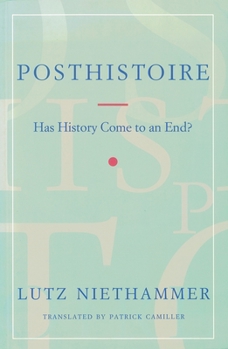Posthistoire: Has History Come to an End?
Select Format
Select Condition 
Book Overview
History, be it Fukuyama's liberal democracy or Baudrillard's hyperreality, according to a number of pundits, has reached the end of the line. This description may be from another edition of this product.
Format:Paperback
Language:English
ISBN:0860916979
ISBN13:9780860916970
Release Date:May 1994
Publisher:Verso
Length:158 Pages
Weight:0.65 lbs.
Dimensions:0.6" x 6.1" x 9.2"
Age Range:18 years and up
Grade Range:Postsecondary and higher
Related Subjects
HistoryCustomer Reviews
1 rating
The Voice of Reason
Published by Thriftbooks.com User , 16 years ago
When Lutz Niethammer published his POSTHISTOIRE in 1989 in a lucid effort to derail the End of History postmodernist writers, his book was unfortunately lost in the academic shuffle caused by the release of the far more sensationally touted THE END OF HISTORY by Francis Fukuyama. Both writers considered the not so novel theory that the then current age of the post WWII was an era bereft both of progress in the arts and any Great Men,thus ensuring that the age would be eternally marked by a human race satisfied with security and materialism to the exclusion of intellectual advancement. Since the human race might exist in the physical sense it would vanish in the aesthetic one. Human history would then "come to an end." Fukuyama urged that his readers accept this as inevitable. Niethammer argued the opposite. Most of Niethammer's thesis consists of extended analyses of writer-philosophers (excluding Fukuyama) who over a`period of several decades thought the end of days was nigh. Niethammer considers eight of them, all of whom not surprisingly were variously ex-Nazis, current Communists, or fascists of assorted stripes: Hendrick de Man (Paul's uncle), Carl Schmitt, Arnold Gehlen,Ernst Junger, Martin Heidegger, Walter Benjamin, Alexander Kojeve, and Bertrand de Jouvenal. Fukuyama wisely limited his analyses of them for obvious reasons but Niethammer hammers home the clear point all eight shared an utter contempt for the Common Man to influence the forward movement of this or any later age. He also points out that the current mess that academia finds itself in as it denies the existence of absolutes like truth, justice, history, and universality all can find a common ancestry in a belief that human progress had suddenly stopped dead in its tracks. In fact, the entire postmodern era typified by Baudrillard and Lyotard owe a great deal to this group of eight who plainly saw that the racist sentiments that plunged Europe into the abyss of the 1940s was a time that should be mourned in its passing. For them, at least, the question of the end of history is one of enthusiastic affirmation. For dissenters like Niethammer and other humanists, the conclusion is quite the opposite.





